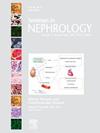The Role of Patient-Reported Experience and Outcome Measures in Kidney Health Equity-Oriented Quality Improvement
IF 3.5
3区 医学
Q2 UROLOGY & NEPHROLOGY
引用次数: 0
Abstract
Risk, prevalence, management, and outcomes in chronic kidney disease (CKD) are influenced by social and broader determinants of health. Consequently, there are wide-ranging kidney health inequities. As patients are key stakeholders, their perspectives on the care they receive and on health status are central in guiding health system improvement, particularly to reduce the impact of disadvantage. Patient-reported experience measures (PREMs) and patient-reported outcome measures (PROMs) are important self-report tools in quality improvement, acting to guide initatives aimed at enhancing access to timely and relevant support. However, the extent to which PREMs and PROMs address the reduction of kidney health inequities is unclear. The aim of this review is to summarize how PREMs and PROMs are designed and implemented, highlighting key dimensions that are integral to health equity-oriented quality improvement in kidney care. There are several problems yet to be overcome so that such tools do not unintentionally reproduce kidney health gaps. Inclusive generation of the scope of tools, transparent reporting on attributes of patients who engage, and embedding PREMs and PROMs within a framework of value-based quality improvement is fundamental to their impact as part of equitable health system transformation.
肾脏健康公平导向质量改进中的患者报告体验和结果测量的作用。
慢性肾脏病 (CKD) 的风险、发病率、管理和结果受到社会和更广泛的健康决定因素的影响。因此,肾脏健康存在着广泛的不公平现象。由于患者是关键的利益相关者,他们对所接受的医疗服务和健康状况的看法对于指导医疗系统的改进,尤其是减少不利因素的影响至关重要。患者报告体验测量法(PREMs)和患者报告结果测量法(PROMs)是质量改进中重要的自我报告工具,可用于指导旨在提高及时获得相关支持的机会的行动。然而,PREMs 和 PROMs 在减少肾脏健康不平等方面的作用尚不明确。本综述旨在总结 PREMs 和 PROMs 的设计和实施方法,强调以健康公平为导向的肾脏医疗质量改进不可或缺的关键因素。有几个问题尚待克服,以便这些工具不会无意中再现肾脏健康方面的差距。工具范围的包容性、对参与患者属性的透明报告,以及将 PREMs 和 PROMs 纳入以价值为基础的质量改进框架,是这些工具作为公平医疗系统转型的一部分产生影响的基础。Semin Nephrol 36:x-xx © 20XX Elsevier Inc.保留所有权利。
本文章由计算机程序翻译,如有差异,请以英文原文为准。
求助全文
约1分钟内获得全文
求助全文
来源期刊

Seminars in nephrology
医学-泌尿学与肾脏学
CiteScore
5.60
自引率
0.00%
发文量
27
审稿时长
6-12 weeks
期刊介绍:
Seminars in Nephrology is a timely source for the publication of new concepts and research findings relevant to the clinical practice of nephrology. Each issue is an organized compendium of practical information that serves as a lasting reference for nephrologists, internists and physicians in training.
 求助内容:
求助内容: 应助结果提醒方式:
应助结果提醒方式:


